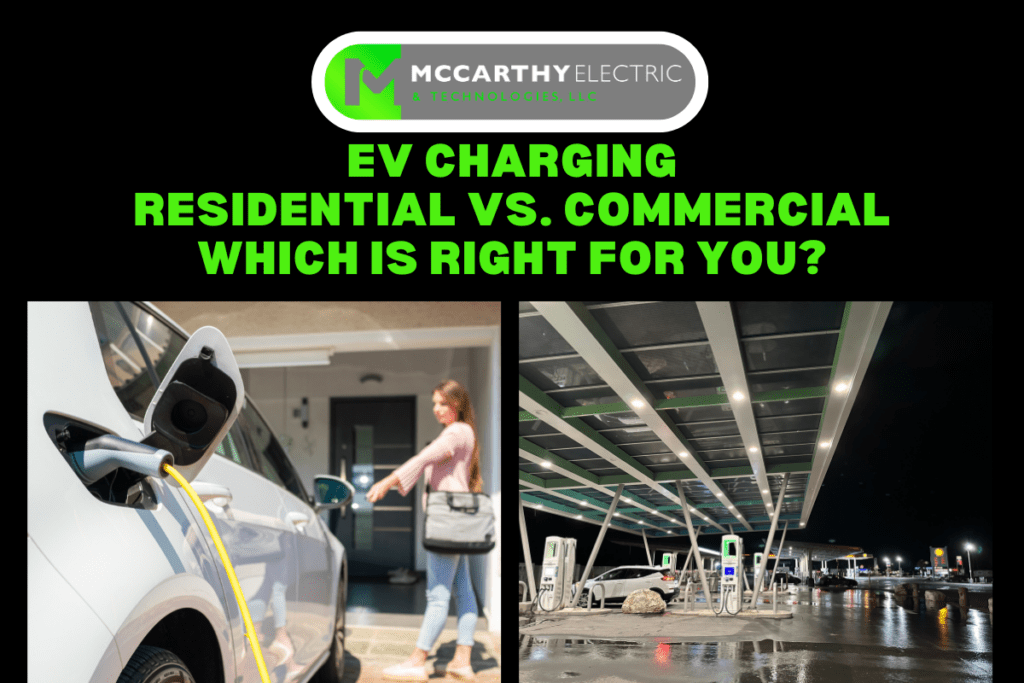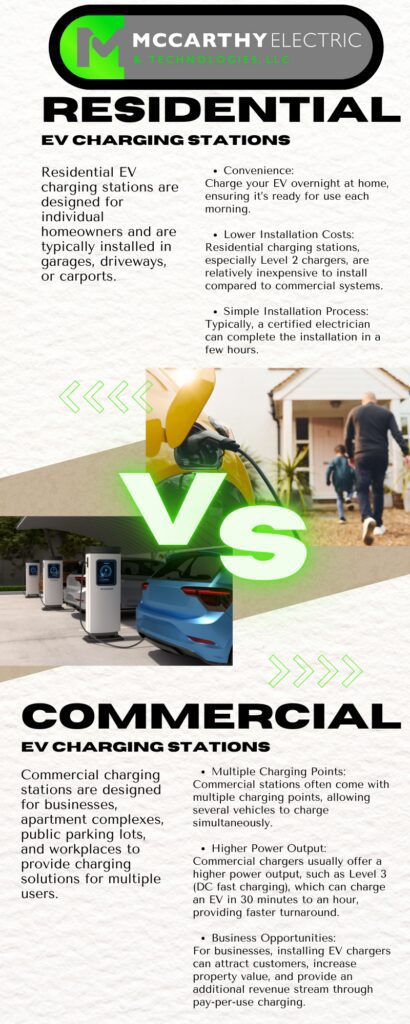Residential vs. Commercial EV Charging: Which Is Right for You?
With the growing adoption of electric vehicles (EVs), installing a charging station has become a smart and often necessary move for homeowners, business owners, and property managers alike. However, choosing between a residential and a commercial EV charging station can be challenging. This guide will break down the key differences in needs, costs, and installation processes to help you determine which option is best for you.
Residential EV Charging Stations
Residential EV charging stations are designed for individual homeowners and are typically installed in garages, driveways, or carports.
Key Features and Benefits
- Convenience:
- Charge your EV overnight at home, ensuring it’s ready for use each morning.
- No need to rely on public charging infrastructure, saving time and providing peace of mind.
- Lower Installation Costs:
- Residential charging stations, especially Level 2 chargers, are relatively inexpensive to install compared to commercial systems.
- Cost Insight: On average, installing a Level 2 home charging station costs between $500 and $2,000, depending on the property’s electrical setup.
- Simple Installation Process:
- Typically, a certified electrician can complete the installation in a few hours.
- Practical Tip: Check if your home’s electrical panel can support the additional load of an EV charger, and consider future-proofing by installing a higher-capacity charger.
Ideal for:
- Homeowners who want the convenience of charging at home.
- EV owners looking for an affordable, hassle-free charging solution.
Learn about our residential EV charger installation services for homeowners.
Commercial EV Charging Stations
Commercial charging stations are designed for businesses, apartment complexes, public parking lots, and workplaces to provide charging solutions for multiple users.
Key Features and Benefits
- Multiple Charging Points:
- Commercial stations often come with multiple charging points, allowing several vehicles to charge simultaneously.
- Tip: Opt for networked chargers to monitor usage, set pricing, and manage access.
- Higher Power Output:
- Commercial chargers usually offer a higher power output, such as Level 3 (DC fast charging), which can charge an EV in 30 minutes to an hour, providing faster turnaround.
- Cost Insight: While Level 3 chargers offer speed, they come with a higher installation cost, ranging from $10,000 to $40,000 per unit, including electrical work and permits.
- Business Opportunities:
- For businesses, installing EV chargers can attract customers, increase property value, and provide an additional revenue stream through pay-per-use charging.
- Data Insight: A recent survey revealed that 85% of EV owners are likelier to visit businesses with charging stations, indicating a potential competitive advantage.
Ideal for:
- Businesses that want to attract EV owners, including retail stores, restaurants, and hotels.
- Apartment Complexes and Workplaces aiming to offer added value to tenants and employees.
- Public Parking Lots seeking to provide charging services and earn revenue.
Explore our commercial EV charger installation services tailored for businesses.
Installation Process: Residential vs. Commercial
Residential Installation
- Simple Process: A certified electrician will assess your electrical panel, install a new circuit if needed, and mount the charging station.
- Timeline: Most installations can be completed in a few hours.
- Permits: In some areas, a permit may be required, but the process is straightforward and typically handled by the electrician.
Commercial Installation
- Complex Assessment: Commercial installations require a more detailed evaluation of electrical capacity, potential upgrades, and placement to ensure accessibility.
- Timeline: Depending on the complexity, installation can take several days to weeks, especially if trenching, electrical upgrades, or permitting is needed.
- Permits: Commercial installations often involve stricter permitting and compliance with local codes, which can extend the timeline.
Learn more about the EV charger installation process with McCarthy Electric & Technologies.
Cost Comparison: Residential vs. Commercial
- Residential Charging Stations:
- Upfront Cost: $500 – $2,000 (Level 2 charger).
- Installation: $500 – $1,500, depending on electrical work.
- Commercial Charging Stations:
- Upfront Cost: $2,000 – $40,000+ (Level 2 to Level 3 chargers).
- Installation: $2,000 – $10,000+, depending on infrastructure needs and permits.
Practical Tip: To offset costs, consider potential government rebates and incentives available for both residential and commercial EV charging installations.
Which One Is Right for You?
The decision between residential and commercial EV charging stations depends on your specific needs:
- Go Residential if:
- You’re a homeowner who wants the convenience of charging at home.
- You seek an affordable, easy-to-install solution for personal use.
- Go Commercial if:
- You own a business, manage a property, or want to provide charging services to customers, tenants, or employees.
- You want to offer fast-charging options (Level 3) and potentially monetize your charging infrastructure.
Whether residential or commercial, McCarthy Electric & Technologies has the expertise to meet your EV charging needs.
FAQs: Choosing Between Residential and Commercial EV Charging
Can I install a commercial charger at my home?
Technically, yes, but commercial chargers are costlier and typically require more power than a residential setting can provide.
Do commercial chargers have higher maintenance costs?
Commercial chargers require regular maintenance, especially networked and Level 3 chargers, which may incur higher maintenance costs than residential units.
Are there rebates for both residential and commercial installations?
Yes, various federal, state, and local incentives are available to reduce the cost of residential and commercial EV charger installations.
How do I decide on the right charger type?
Consider factors like charging speed, number of vehicles, and usage frequency. Consult with an electrician for an evaluation and recommendation.
Can I upgrade my residential charger to a commercial one later?
Upgrading typically involves significant electrical and infrastructure work, so it’s best to consult a professional for a proper assessment.
Expert Tips for Choosing an EV Charger
- Assess Your Needs: Consider the number of EVs and charging frequency to determine the charger capacity you need.
- Plan for the Future: With EV adoption rising, installing a higher-capacity charger may future-proof your property.
- Hire a Professional: Work with certified electricians to ensure your charger is installed safely and complies with local regulations.


